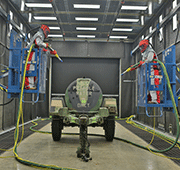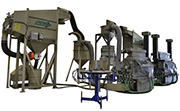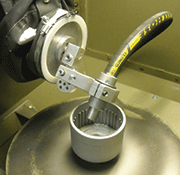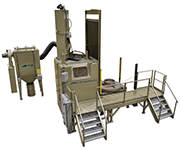E-Archive
Interview
in Vol. 15 - March Issue - Year 2014
Leveraging Global Resources for Future Growth

Se

Blast room with in-floor belt abrasive recovery, supplementary vacuum recovery, and articulating work platforms

Engineered shot peening and finishing cabinet with multiple nozzles, vibratory separation, and media-add system

Automated system with 12 nozzles and dual line processing of flat stock

Cabinet with nozzle-manipulating and pick-and-place (not shown) robotics

Automated system with personnel platform provided for observation and positioning of large, heavy parts loaded by overhead hoist
Clemco International Inc. and Clemco Industries Corp. are sister companies with common U.S. ownership; both have engineering and manufacturing operations. Clemco Industries, with operational headquarters near Saint Louis, Missouri, primarily serves North and South American markets. Clemco International, with operational headquarters near Munich, Germany, is responsible for serving the rest of the world through locations in Europe and Asia. The Clemco companies design, build, and market air-operated blast equipment serving contractor and industrial markets. MFN recently had the opportunity to interview Seán Cleary, Global Business Development Manager, Clemco International Inc.
(?) MFN: It's been a couple years since MFN last checked in with Clemco. What's new?
(!) S.C.: Quite a bit actually. We're in the process of solidifying our global operations, creating better lines of communication, forums for R&D and product development, and creating company-wide strategies for development around the world. We've been investing in ourselves to support business growth now and into the future.
(?) MFN: You mention self-investment. What do you mean?
(!) S.C.: It means a number of things. We have been adding products, facility space and equipment, as well as staff.
An important fairly recent acquisition is that of long-time business partner, Munkebo, of Denmark, who is the world leader in vacuum systems, site containment and recovery equipment, climate control products, and dust collection. We are working to dovetail their products, manufacturing capacity, and engineering prowess into our global network.
Staffing-wise, we are making efforts to bring along the next generation of leadership. And we are stepping up our efforts to innovate through investing in additional engineering resources both in the U.S. and in Europe.
(?) MFN: What sort of "additional engineering resources?"
(!) S.C.: Industry worldwide is changing and advancing, and we're keeping pace. We're using developments undertaken in each of our locations, in concert with our customers, to continue to sharpen our capabilities in control and user interface, robotics as well as part and nozzle manipulation, abrasive media usage and reclamation, and the containment and cleanliness of work chambers and blast rooms. We see more customers requiring cleaner, quieter, and more efficient blast equipment, and automated solutions for their production needs.
(?) MFN: So can we expect a "different" Clemco?
(!) S.C.: No; what we are doing is solidifying our operations, undertaking a new treatment of corporate image and marketing, and releasing new products and customer interfaces worldwide. We are not deviating at all from what defines Clemco.
What has been passed down through the generations is the importance of people in making the business successful. My grandfather, the founder of Clemco, often said "Business is people and service." That philosophy still guides how we do things both internally and externally. This is a company based on long-term relationships, which we all take seriously.
Another thing that defines us is delivering value, the best quality for the customer's dollar. Easier access to most goods these days in the form of clones and copies has made it more common for customers to expect a product to fail, shrugging off the need to replace it. Some choose to buy on price rather than on quality. In some respects, we now see that we've become a "throwaway culture."
(?) MFN: "Throwaway culture?"
(!) S.C.: It's the mentality of people who choose replacing versus repairing. This attitude is becoming more prevalent in the blast world with the availability of lower-priced copies made from inferior materials. Our experience, however, demonstrates that if a blaster is using a dependable, quality system, maintenance will keep the equipment going for a very long time. The root of dependability and durability is quality. We design and build our equipment to last a lifetime.
(?) MFN: I'd be interested in hearing where you think the abrasive blast industry may be headed.
(!) S.C.: Blasting follows the development and movement of the industries that need it, which is to say most of them. In the U.S., we've begun another phase of large scale energy production, in both oil and natural gas. Energy has always been strongly tied to blasting; it’s essential for the maintenance of equipment in the field, maintenance of pipelines, and in the manufacturing of the equipment to derive, refine, and transmit fuels. In keeping with our customers, blasting is seeing an upsurge.
Energy expansion is just as prevalent in the rest of the world, and in many different forms. We have earned a place as the go-to provider of blast equipment for much of the "alternative" energy industry, chiefly in wind towers and turbines. We work closely with the large manufacturers of this equipment worldwide, and feel we've gotten very good at providing what these alt-energy industries require.
No less a growing market for our equipment is infrastructure, both expansion of it and its repair. In the U.S., most states have a pretty pressing need to fix up their roads, bridges, pipelines and other infrastructures, and all this requires refurbishing, cleaning, re-coating and so forth. This situation is mirrored in many parts of the world as well as in new infrastructure being built in developing countries.
Manufacturing is another area in which there will be changes in the future. And manufacturing and blasting are codependent. But the utilization of blast technology by manufacturing is going through a significant change, one that will feature a far higher degree of automation, and the specialization of labor. Production-scale machines need to be reliable, predictable, and high-output. Blast cabinets and custom blast systems for the prep of products before shipment have been following this trend, and will continue to do so in the future, with greater and more sophisticated parts handling, more accurate and sophisticated blast apparatuses, and a higher degree of autonomous robotics usage.
Technology is getting more sophisticated, precise, and less expensive in terms of programmable parameters, testing and gauging, and automated function, driving us to incorporate these new features into our equipment. Customers request them more often now as the cost of programmable controllers has come down and as the cost of manual labor has risen. Customers are now seeing value in automated blast systems.
(?) MFN: Automation? Do you ever see the blaster being more or less replaced?
(!) S.C.: No, I don’t anticipate that an automated machine will ever remove the need for human intelligence and talent when it comes to blasting. What I envision happening is blasters will share the experience of workers in virtually every industry: they will need new skills. High-tech blasting requires new skills, and has new parameters to factor in. Operators will learn how to use new tools, and face the realities of concerns about safety, containment, productivity and comfort. The world is learning about the cost of careless industrial development, and things like emissions, residual waste, and environmental fallout loom larger than ever, as they should. We need to learn how to work smarter, cleaner, and better. And a knowledgeable operator is the first step in terms of working that way in a blast environment.
(?) MFN: And that's something Clemco is working to accommodate?
(!) S.C.: Clemco has a long tradition of education. We have literature, instructional booklets, and presentations on the safety and performance parameters of blasting; all free for the asking. Some fifty years ago, we published Blast Off, the first book explaining blasting in a comprehensive, approachable way and that booklet, with its many subsequent revised editions, has become a bible in the industry. And with the utility of digital communication, we’re trying to build on that tradition as much as we can, with webinars, online resources, and demonstrations.
(?) MFN: Sounds like you are pretty optimistic about the future?
(!) S.C.: I think Clemco is stronger than ever. We have the resources we need to continue to grow and expand, never losing sight of the culture of dependability and customer support for which we’ve been known for nearly seven decades. We are optimistic about the future of the industry and our own future. We anticipate growth from the initiatives we are undertaking and we see many opportunities for growth in our existing markets and new ones.
MFN would like to thank Seán Cleary for the interview!
For Information:
Clemco Industries Corp.
Washington, Missouri, USA
Tel. +1.636.239 0300
Fax +1.800.726 7559
E-mail: info@clemcoindustries.com
www.clemcoindustries.com



























